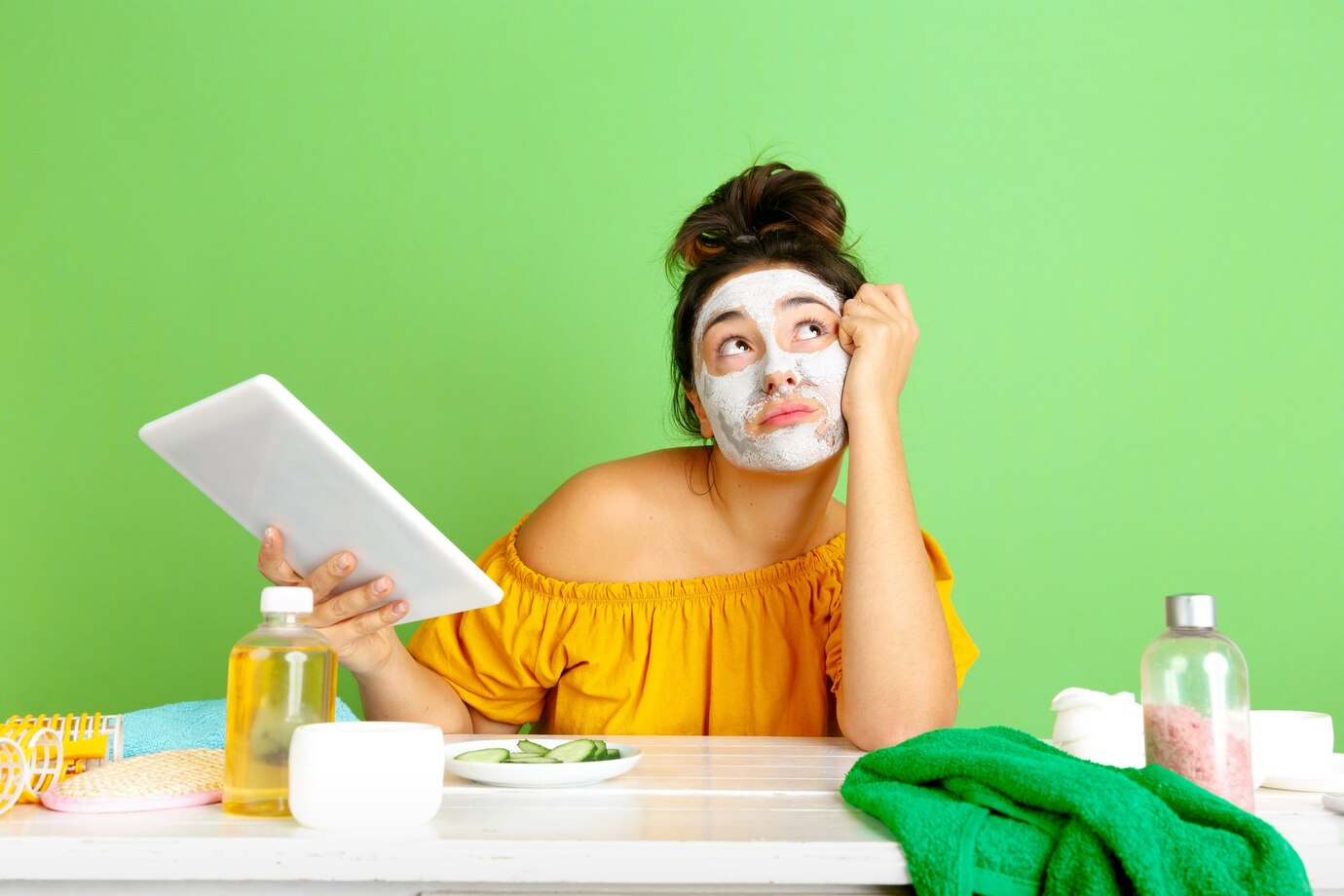When it comes to skincare, we’ve all been there. We buy the latest products, follow influencers’ routines, and religiously apply layers of serums, moisturizers, and sunscreens—all in the name of glowing skin. But what if I told you that your skincare routine might be doing more harm than good? That the very products you’re using, often marketed as miracle workers, could be causing irritation, breakouts, or even accelerating the aging process? In a world dominated by beauty trends and countless products, it’s easy to fall into the trap of “more is better.”
In this blog, we’ll uncover the best-kept secrets of the beauty industry, helping you reassess your skincare routine and ensure that what you’re doing for your skin is actually benefiting it in the long run.

1. The Overuse of Harsh Exfoliants
Exfoliation is a crucial step in many skincare routines. It removes dead skin cells, helps to prevent clogged pores, and can brighten the complexion. However, many of us have fallen into the trap of exfoliating too often or using products that are too harsh for our skin.
Why It’s Harmful:
- Stripping the Skin: Exfoliating daily or using harsh scrubs can strip the skin of its natural oils, leading to irritation, dryness, and even more breakouts. While exfoliation is essential, overuse can damage the skin’s protective barrier, leaving it vulnerable to environmental damage. The skin barrier acts as a shield against pollutants and irritants, and when damaged, the skin is more prone to inflammation, redness, and sensitivity.
- Sensitivity: Over-exfoliating can cause the skin to become sensitized, making it react more easily to other products and environmental stressors like pollution and UV rays. This can lead to a cycle of irritation where the skin becomes more reactive and vulnerable to further damage.
The Solution:
- Frequency is Key: Exfoliating 2-3 times a week is generally sufficient for most skin types. For those with sensitive skin, once a week may be more than enough. This gives the skin time to repair itself while still benefiting from the removal of dead skin cells.
- Gentler Exfoliants: Instead of using abrasive scrubs, opt for chemical exfoliants with mild exfoliating acids like lactic acid or glycolic acid, which can slough off dead skin cells without causing friction or irritation. These exfoliants are gentler on the skin and help encourage cell turnover without damaging the skin’s surface.
- Hydration Post-Exfoliation: After exfoliating, always follow up with a hydrating serum or moisturizer to replenish the skin’s moisture levels and support its barrier function.
2. The Dangers of Overusing Active Ingredients
Active ingredients like retinol, vitamin C, and AHA/BHAs have revolutionized skincare, offering numerous benefits, including reducing signs of aging and promoting a brighter complexion. But with the abundance of new products promising fast results, many of us load up our routines with too many actives, thinking that more will yield faster results.
Why It’s Harmful:
- Skin Irritation: Using too many actives in one routine can irritate the skin. For example, layering products with retinol and AHA/BHA can cause redness, peeling, and even cause long-term damage to your skin barrier. When overused, these ingredients can lead to inflammation and weaken the skin’s defense mechanisms.
- Increased Sensitivity: Some actives, especially retinoids and acids, make the skin more sensitive to sunlight, increasing the risk of sunburn, dark spots, and premature aging if sunscreen isn’t applied diligently. These products can make the skin more prone to photo-damage, leading to pigmentation and accelerated signs of aging.
The Solution:
- Less is More: Choose a few key active ingredients and introduce them slowly into your routine. For example, you can use retinol at night and vitamin C in the morning. Pair them with hydrating ingredients to maintain the skin’s barrier. When using actives, remember that it’s not about how many products you use, but how well they work together.
- Use Actives on Rotation: Don’t use multiple actives on the same day. Instead, alternate your routine. For instance, apply vitamin C in the morning on one day and AHA/BHA at night on another. This prevents irritation and helps your skin tolerate active ingredients more effectively.
- Don’t Forget the SPF: Always apply a broad-spectrum sunscreen every day, especially when using actives like retinol or acids, which can make your skin more vulnerable to UV damage.
3. The Myth of “One-Size-Fits-All” Skincare
We’ve all been guilty of following a viral skincare routine because it worked wonders for someone else—often someone with a different skin type. The truth is that what works for one person doesn’t necessarily work for another. From skin texture to oil production, skin types are vastly different and require tailored routines.
Why It’s Harmful:
- Worsening Skin Issues: Using products that aren’t suited to your skin type can lead to clogged pores, increased oiliness, excessive dryness, or even irritation. For example, using a heavy, oil-based moisturizer on oily skin can clog pores and lead to breakouts, while dry skin may not receive enough moisture from lightweight products.
- Unnecessary Ingredients: Applying products with ingredients your skin doesn’t need can overload it, causing imbalances. For example, using astringent toners or alcohol-based products on dry skin can strip it of essential moisture, worsening conditions like eczema or dehydration.
The Solution:
- Identify Your Skin Type: Assess your skin type before adopting any routine. Is your skin oily, dry, sensitive, or combination? Choosing products that cater to your skin’s specific needs is essential. Knowing your skin type helps you avoid using products that might aggravate the condition or make it worse.
- Customized Routine: If you have sensitive skin, for instance, avoid products with fragrances or alcohol. On the other hand, if your skin is acne-prone, focus on salicylic acid and non-comedogenic products that won’t clog pores. If your skin is dehydrated, look for products that contain hyaluronic acid, glycerin, and ceramides for hydration.
- Adapt Your Routine Seasonally: Your skin’s needs can change with the seasons, so don’t hesitate to adjust your skincare routine accordingly. For example, during winter, you may need richer moisturizers, while in summer, you may need lighter formulas to combat humidity and oiliness.
4. The Importance of Sunscreen (Even on Cloudy Days)
Sunscreen is one product that many of us neglect, especially when we’re indoors or if the weather isn’t sunny. However, UV rays are always present, and skipping sunscreen can lead to premature aging, pigmentation, and even skin cancer.
Why It’s Harmful:
- UV Damage: Without proper protection, your skin is exposed to harmful UV rays that accelerate aging and cause dark spots, wrinkles, and loss of elasticity. UV rays are responsible for about 80% of skin aging and can lead to skin cancer over time.
- Invisible Sun Exposure: UV rays penetrate through clouds and windows, so it’s important to wear sunscreen every day, regardless of the weather or your activities. Even on cloudy days or while you’re indoors, your skin is still exposed to UV rays from natural and artificial light sources.
The Solution:
- Daily Sunscreen Application: Incorporate sunscreen into your daily skincare routine, and make sure to use a broad-spectrum SPF of at least 30. Reapply every two hours if you’re outdoors, especially if you’re sweating or swimming.
- Sunscreen Options: Opt for non-comedogenic sunscreens if you have acne-prone skin or mineral sunscreens for sensitive skin. There are also tinted sunscreens that provide additional protection against blue light emitted from screens, making them perfect for those working long hours in front of computers.
- Physical vs. Chemical Sunscreens: Physical sunscreens with zinc oxide or titanium dioxide create a physical barrier against UV rays, while chemical sunscreens absorb UV radiation. Choose based on your skin’s needs, as some people may find chemical sunscreens irritating.
5. The Over-Hydration Myth
We all know how important hydration is, and many of us use numerous moisturizers, serums, and mists throughout the day. But is your skin really soaking up all that moisture? The answer might surprise you—hydration is crucial, but over-hydrating or applying the wrong types of moisture can create more issues.
Why It’s Harmful:
- Skin Congestion: Too many hydrating products or thick layers can lead to clogged pores, causing breakouts or a dull complexion. When your skin can’t breathe, it may become congested, leading to blackheads, whiteheads, and other forms of acne.
- Overuse of Moisturizers: Sometimes, too much of a good thing can lead to excessive oil production and imbalance. Applying too many layers of moisturizers can overload your skin, making it greasy or giving it an overly shiny appearance.
The Solution:
- Hydrate from Within: While topical hydration is important, drinking plenty of water daily is the most effective way to keep your skin hydrated. Hydration starts from the inside, and keeping your body properly hydrated ensures your skin stays plump and youthful.
- Light Layering: Use lightweight, water-based serums and moisturizers that hydrate without overwhelming your skin. If your skin is oily, a gel moisturizer might be all you need. It’s important to choose products that match your skin’s needs and not overload it with too much moisture.
- Avoid Overloading on Mists: While facial mists are refreshing, they can sometimes be too heavy if used frequently. Instead, use them in moderation to provide a quick burst of hydration during the day.
Conclusion: Reassess Your Skincare Routine
Your skincare routine should work for you, not against you. By carefully selecting products, sticking to a routine that suits your skin type, and avoiding the temptation to “overdo” it with actives or exfoliation, you can achieve healthier, more radiant skin. It’s time to stop blindly following trends and start making smarter skincare choices. Sometimes, less really is more—so stop stressing over the latest “miracle” products and focus on what your skin truly needs. When in doubt, keep it simple and make sure your routine is working for you, not harming you.







